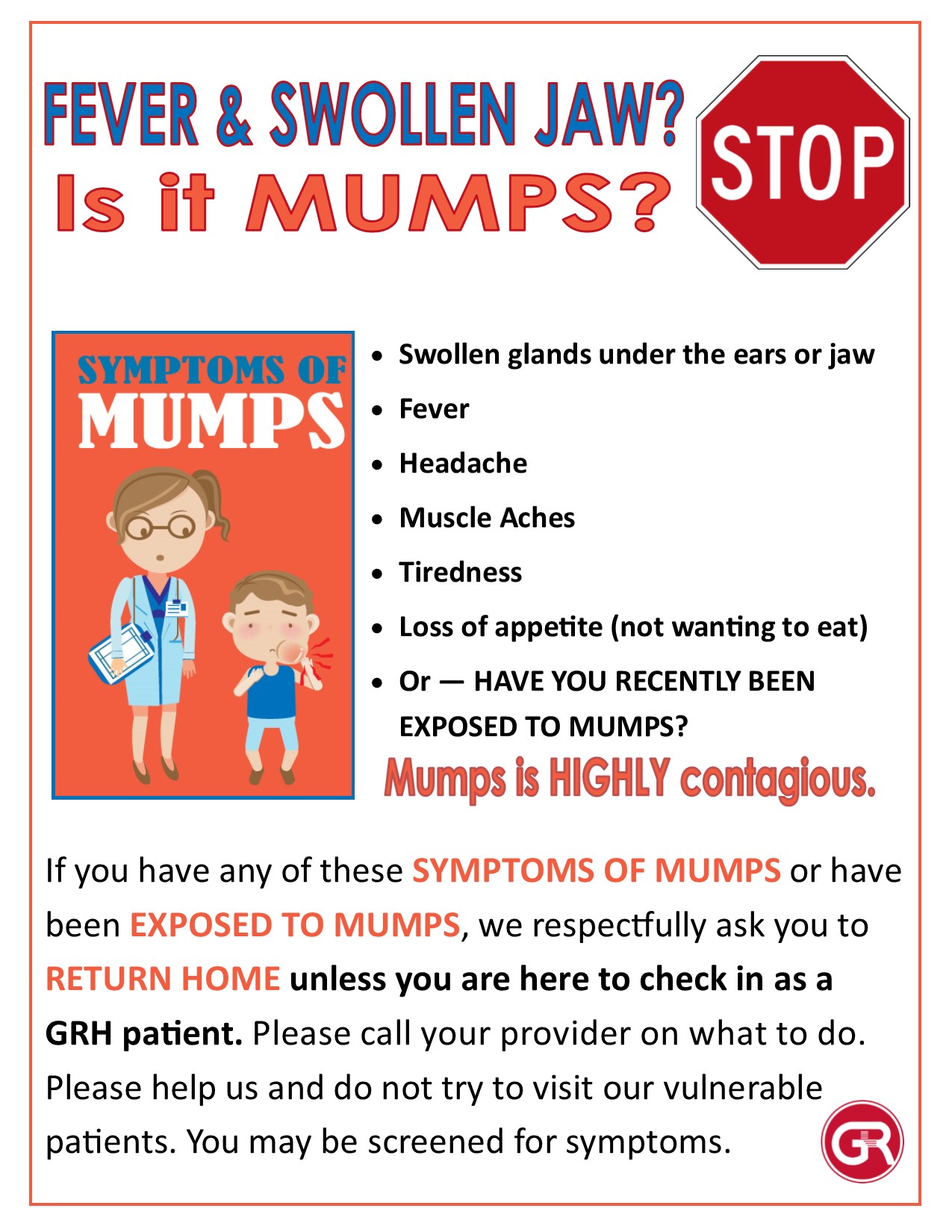
6/21/17 UPDATE: As of Wednesday, June 21st, Grande Ronde Hospital (GRH) has updated our visitor restrictions to the Family Birthing Center (FBC) and are also enforcing visitor hours. We are asking the community’s help. Know the signs and symptoms of mumps (below), and do the right thing by NOT visiting patients in our hospital if you experience ANY of them. Please read the details:
With regards to Hospital’s General Visiting Hours:
During this time, we are taking the precaution of enforcing visiting hours of 11 AM to 8:30 PM. We understand the community has come to expect some leeway in this area, as we have always wanted to keep our doors open to visitors – an important part of the healing process for our patients. However, during this time, it is in everyone’s best interest to keep these hours.
With regards to visiting the Hospital’s Family Birthing Center:
We have relaxed the restriction for visitors to the Family Birthing Center (FBC) and are no longer limiting it to the immediate family only. However, because mumps is highly contagious and can have serious effects on babies, our staff will be screening FBC visitors for symptoms, exposure and up to date immunizations. We will also ask FBC visitors to wear a mask.
Signs and Symptoms of Mumps:
Mumps is highly contagious. If you have any of the following symptoms, OR have recently been exposed to mumps or exposed to people symptomatic of mumps, we respectfully ask you to stay home and please call your provider:
- Swollen glands under the ears or jaw
- Fever
- Headache
- Muscle Aches
- Tiredness
- Loss of appetite (not wanting to eat)
We know that the Center for Human Development recently release information to the public stating that the average age for those confirmed or suspected of having mumps is 30. That is why it is so important that everyone, regardless of age, have their vaccines updated or their immunity checked. Please contact CHD Public Health at 541-962-8800 for information on immunizations, or contact your provider.
Mumps is a highly contagious disease that can pose serious health risk to infants. We sincerely apologize for any inconvenience, and ask your understanding as we put our littlest patients first. Although no longer common, mumps outbreaks still occur from time to time. We urge you to learn more about mumps and how to protect yourself and your family at: www.cdc.gov/mumps .
In addition, please see the immunization information below that was released by the Center for Human Development on June 14th:
FOR IMMEDIATE RELEASE
TODAY’S DATE: JUNE 13, 2017
FROM: CHD PUBLIC HEALTH
RE: MUMPS CASE CONFIRMED IN UNION COUNTY
CONTACT: ANDI WALSH, COMMUNITY RELATIONS COORDINATOR, 541 962-8880
Mumps Outbreak Continues in Union County
Public Health Schedules Immunization Clinics
The Center for Human Development Inc. Public Health Department is continuing to investigate the recent mumps outbreak in Union County and is now focusing on prevention to keep the disease from spreading further.
Who should get vaccinated?
Union County residents that have not been exposed to the mumps, or have had only one vaccine or have not been vaccinated, and do not have a compromised immune system are encouraged to get their MMR vaccine. There are several opportunities to get vaccinated:
- Make an appointment with your primary care physician to get vaccinated
- Get vaccinated at your local pharmacy. Bi-Mart has vaccine and vaccinates those 7 years and older
- Make an appointment with CHD by calling (541) 962-8800
- Attend the CHD Friday walk-in clinic, from 8:30 am to 2:30 pm
- Attend the CHD MMR vaccination clinic on Wednesday, June 21, from 4pm to 6pm, at the CHD Public Health Clinic, 2301 Cove Avenue, in La Grande
- In addition to being vaccinated, stay away from others when you have mumps
It’s important for everyone to be vaccinated. Having high vaccine rates in the community protects those who can’t be vaccinated because they are too young or have a health condition that prevents it. It also helps protect people for whom the vaccine might not work as well.
Health care workers, Day Care Providers and school staff, including higher education, may have contact with people whose health status makes them more prone to getting mumps. So, it is especially important for these populations to keep their vaccine records up-to–date.
What else should I do to prevent mumps from spreading?
•Cover your mouth and nose with a tissue when you cough or sneeze. Put your used tissue in the trash can. If you don’t have a tissue, cough or sneeze into your upper sleeve or elbow, not your hands.
•Wash your hands often with soap and water.
•Avoid sharing drinks or eating utensils, and smoking devices (e.g. cigarettes, joints and e-cigarettes)
•Disinfecting frequently touched surfaces, such as toys, doorknobs, tables, counters.
To learn more about mumps visit https://www.cdc.gov/mumps/index.html or call your Primary Care Provider.
###